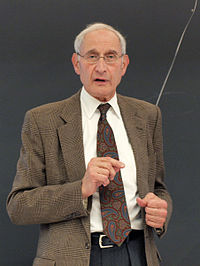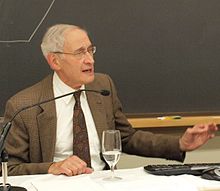- Charles Fried
-
Charles Fried 
38th Solicitor General of the United States In office
1985–1989President Ronald Reagan Preceded by Rex E. Lee Succeeded by Kenneth Starr Personal details Born April 15, 1935
Prague, CzechoslovakiaCharles Fried (born April 15, 1935)[1] is a prominent American jurist and lawyer. He served as United States Solicitor General from 1985 to 1989. He is currently a professor at Harvard Law School.
Contents
Early life and education
Born in Prague, Czechoslovakia, Fried became a United States citizen in 1948. After studying at the Lawrenceville School and receiving his Bachelor of Arts degree from Princeton University in 1956, he attended Oxford University, where he earned a Bachelor's and a Master's degree in Law in 1958 and 1960, respectively, and was awarded the Ordronnaux Prize in Law (1958). In 1960, Fried received his Juris Doctor (J.D.) degree from Columbia Law School, where he was a Stone Scholar. Subsequently he served as law clerk to Supreme Court Justice John Marshall Harlan II.
Legal career
Fried is admitted to the bars of the United States Supreme Court, United States Court of Appeals for the Federal Circuit, the District of Columbia, the Commonwealth of Massachusetts, and numerous U.S. courts of appeals. He argued 25 cases in front of the Supreme Court while in the Solicitor General's office.[2] He has served as counsel to a number of major law firms and clients, and in that capacity argued several major cases, perhaps the most important being [Daubert v. Merrell Dow Pharmaceuticals], both in the Supreme Court and in the Ninth Circuit on remand.
Fried's government service includes a year as Special Assistant to the Attorney General of the United States (1984-85) and a consulting relationship to that office (1983), as well as advisory roles with the Department of Transportation (1981-83) and President Ronald Reagan (1982). In October 1985, President Reagan appointed Fried as Solicitor General of the United States. Fried had previously served as Deputy Solicitor General and Acting Solicitor General. As Solicitor General, he represented the Reagan Administration before the Supreme Court in 25 cases. In 1989, when Reagan left office, Fried returned to Harvard Law School.
From September 1995 until June 1999, Fried served as an Associate Justice of the Supreme Judicial Court of Massachusetts, while teaching constitutional law at Harvard Law School as a Distinguished Lecturer. Prior to joining the court, Fried held the chair of Carter Professor of General Jurisprudence at Harvard Law School. On July 1, 1999, he returned to Harvard Law School as a fulltime member of the faculty and Beneficial Professor of Law. He has served on the Harvard Law School faculty since 1961, teaching courses on appellate advocacy, commercial law, constitutional law, contracts, criminal law, federal courts, labor law, torts, legal philosophy, and medical ethics.
Fried has published extensively. He is the author of nine books and over 30 journal articles, and his work has appeared in over a dozen collections. Unusually for a law professor without a graduate degree in philosophy, he has published significant work in moral and political theory only indirectly related to the law; Right and Wrong, for instance is an impressive general statement of a Kantian position in ethics with affinities with the work of Thomas Nagel, John Rawls, and Robert Nozick. Fried has been Orgain Lecturer at the University of Texas (1982), Tanner Lecturer on Human Values at Stanford University (1981), and Harris Lecturer on Medical Ethics at the Harvard Medical School (1974-75). He was awarded a Guggenheim Fellowship in 1971-72. Fried is a member of the National Academy of Sciences's Institute of Medicine, the American Academy of Arts and Sciences, and the American Law Institute.
Politics and affiliations
In September 2005, Fried testified before the Senate Judiciary Committee in support of the nomination of John Roberts to become Chief Justice of the United States. After the nomination of Samuel Alito to the U.S. Supreme Court, Fried praised Alito as an outstanding judge but dismissed claims that Alito is radical, saying, "He is conservative, yes, but he is not radically conservative like Scalia."[3] Fried testified before the Senate Judiciary Committee and wrote a New York Times op-ed in support of Alito, who had served under him in the Solicitor General's office.[4]
On October 24, 2008, despite his previous support for the presidential aspirations of Senator John McCain, Fried announced that he had voted for Senator Barack Obama for President by absentee ballot. Fried cited Senator McCain's selection of Governor Sarah Palin as his running mate as the principal reason for his decision to vote for Senator Obama.[5] As president of the Harvard Law Review in 1990, Obama had published an article Fried wrote criticizing the effects of race-based affirmative action.[6] Fried later told The Wall Street Journal:
- "I admire Senator McCain and was glad to help in his campaign, and to be listed as doing so; but when I concluded that I must vote for Obama for the reason stated in my letter, I felt it wrong to appear to be recommending to others a vote that I was not prepared to cast myself. So it was more of an erasure than a public affirmation — although obviously my vote meant that I thought that Obama was preferable to McCain-Palin. I do not consider abstention a proper option."[7]
In February 2011, Fried testified before the Senate Judiciary Committee in support of President Obama's health care reform law.[8] When asked by Illinois Senator Richard Durbin to respond to critics of the law's individual mandate who ask: "[I]f the government can require me to buy health insurance, can it require me to have a membership in a gym, or eat vegetables?,” Fried replied:
"Yes. We hear that quite a lot. It was put by Judge Vinson, and I think it was put by Professor Barnett in terms of eating your vegetables, and for reasons I set out in my testimony, that would be a violation of the 5th and the 14th Amendment, to force you to eat something. But to force you to pay for something? I don’t see why not. It may not be a good idea, but I don’t see why it’s unconstitutional.[9][10]
Fried is an adviser to the Harvard chapter of the Federalist Society.[11]
Works
- Because It Is Wrong: Torture, Privacy and Presidential Power in the Age of Terror, by Charles Fried and Gregory Fried (2010 W.W. Norton)
- Modern Liberty and the Limits of Government (2006) (Trad. esp.: La libertad moderna y los límites del gobierno, Buenos Aires/Madrid, Katz editores S.A, 2009, ISBN 978-84-96859-60-9)
- Saying What the Law Is: The Constitution in the Supreme Court (2004)
- Making Tort Law: What Should Be Done and Who Should Do It (with David Rosenberg) (2003)
- Order and Law: Arguing the Reagan Revolution - A Firsthand Account (1991)
- Contract as Promise: A Theory of Contractual Obligation (1981)
- Right and Wrong (1978)
- Medical Experimentation: Personal Integrity and Social Policy (1974)
- An Anatomy of Values: Problems of Personal and Social Choice (1970)
See also
References
- ^ [1]
- ^ "Prof. Charles Fried, McCain advisor, defects to Obama". Harvard Law Record. 2008-10-16. http://www.hlrecord.org/2.4475/mccain-advisor-fried-defects-to-obama-1.577515. Retrieved 2008-10-26.
- ^ Fried, Charles; Morning Edition November 1, 2005, National Public Radio
- ^ Fried, Charles (2006-01-03). "Samuel Alito, in Context". The New York Times. http://www.nytimes.com/2006/01/03/opinion/03fried.html. Retrieved 2008-10-27.
- ^ Cass. R. Sunstein, Reagan Appointee and (Recent) McCain Adviser Charles Fried Supports Obama, The New Republic (October 24, 2008), available at http://blogs.tnr.com/tnr/blogs/the_plank/archive/2008/10/24/reagan-appointee-and-recent-mccain-adviser-charles-fried-supports-obama.aspx.
- ^ "Obama kept Law Review balanced". The Politico. 2008-06-24. http://dyn.politico.com/printstory.cfm?uuid=B1993498-3048-5C12-00FA3C486359EF70. Retrieved 2008-10-27.
- ^ Jones, Ashby (2008-10-24). "Harvard Law Prof, Reagan SG, Gives Obama His Vote". The Wall Street Journal Law Blog. http://blogs.wsj.com/law/2008/10/24/harvard-law-prof-reagan-sg-gives-obama-his-vote/. Retrieved 2008-10-27.
- ^ The Constitutionality of the Affordable Care Act" (witness list)
- ^ Suderman, Peter (2011-02-03) Harvard Law Prof Tells Senate that Congress Can Make You Buy Broccoli, Reason
- ^ Roy, Avik (2011-02-02) Harvard Law’s Fried: A Broccoli Mandate is Constitutional, Forbes
- ^ "Harvard Law School Federalist Society". Harvard Federalist Society. 2005. http://www.law.harvard.edu/students/orgs/fedsoc/2005_events.shtml. Retrieved 2008-10-27.
External links
- Solicitor General Biography at U.S. Department of Justice
- Charles Fried faculty page at Harvard Law School
- Video (and audio) of debate/discussion between Charles Fried and Joshua Cohen on Bloggingheads.tv
 This article incorporates public domain material from websites or documents of the Office of the Solicitor General.
This article incorporates public domain material from websites or documents of the Office of the Solicitor General.Legal offices Preceded by
Rex E. LeeSolicitor General of the United States
1985–1989Succeeded by
Kenneth StarrUnited States Solicitors General Bristow • Phillips • Goode • Jenks • Chapman • Taft • Aldrich • Maxwell • Conrad • Richards • Hoyt • Bowers • Lehmann • Bullitt • Davis • King • Frierson • Beck • Mitchell • Hughes • Thacher • Biggs • Reed • Jackson • Biddle • Fahy • McGrath • Perlman • Cummings • Sobeloff • Rankin • Cox • Marshall • Griswold • Bork • McCree • Lee • Fried • Starr • Days • Dellinger (acting) • Waxman • Barbara Underwood (acting) • Olson • Clement • Garre • Kneedler (acting) • Kagan • Katyal (acting) • Verrilli Categories:
Categories:- 1935 births
- Living people
- Czechoslovak emigrants to the United States
- Law clerks of the Supreme Court of the United States
- Guggenheim Fellows
- Princeton University alumni
- United States Solicitors General
- Harvard Law School faculty
- Naturalized citizens of the United States
- Columbia Law School alumni
- Columbia University alumni
- Alumni of the University of Oxford
- American lawyers
- American legal scholars
- American legal writers
- Federalist Society members
- Massachusetts Supreme Judicial Court justices
- Reagan Administration personnel
- People from Prague
Wikimedia Foundation. 2010.

